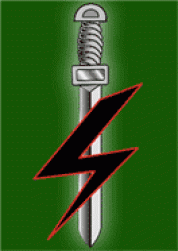Note: This is part four of a multi-part series exploring the various units within the U.K. Special Forces (UKSF).
The Special Forces Support Group (SFSG) is a fairly new special forces unit. Officially formed on 3 April 2006, the SFSG is based on a core segment of the soldiers from the 1st Battalion Parachute Regiment (1 PARA), with added servicemen from the Royal Marines and Royal Air Force Regiment. The SFSG provides specialized support to UKSF operations.

The Special Forces Support Group
The unit’s creation arose from the UKSF’s demand for light infantry support following its involvement in the Battle of Tora Bora, during which two Special Boat Service (SBS) squadrons assaulted the al-Qaeda-held cave system.
The SFSG functions as a quick reaction force for UKSF operations. It secures an area for offensive operations alongside UKSF forces, carries out secondary strikes and diversionary raids, and backfills UKSF missions. Its responsibilities also include developing and mentoring foreign militaries, though formally this task falls to the SAS. With the U.K. threat level so high and the UKSF stretched thin, the SFSG has also assumed the role of domestic counterterrorism (CT). The SFSG deploys small teams on operations around the world, including those in Afghanistan, Iraq, and Syria.
The Special Forces Support Group Operator
SFSG candidates pass through an internal training and selection course. It trains them in various special forces techniques, including resistance to interrogation, escape and evasion (SERE), close-quarters battle (CQB), and high-altitude, low-opening (HALO) jumps. All infantrymen selected for the SFSG have passed the P Company selection course run by the Parachute Regiment, the Royal Marines Commando Course, or the RAF Pre-Parachute Selection Course.
The History of the Special Forces Support Group
We can trace the SFSG back to the early 2000s in Sierra Leone during Operation Barras, in which members of 1 PARA attacked an insurgent base while the SAS/SBS rescued fellow soldiers from a nearby camp. It had been reported that the SFSG in Iraq had committed a company to the U.S.-led Task Force 145 (TF-145). TF-145, later renamed TF-88, was engaged in Iraq and was responsible for tracking down senior al-Qaeda members.

In Afghanistan, the SBS and SFSG were involved in Operation Medusa in September 2006. OP Medusa was a united assault on Taliban forces in the strategically important Panjwai district of Afghanistan. NATO members from the U.K., U.S., Canada, and the Netherlands participated in the assault. The SBS and SFSG played key roles in the organized attacks, acting as both attacking forces (SBS) and cut-off groups (SFSG).



























COMMENTS
There are 4 Comments on this article.
You must become a subscriber or login to view or post comments on this article.